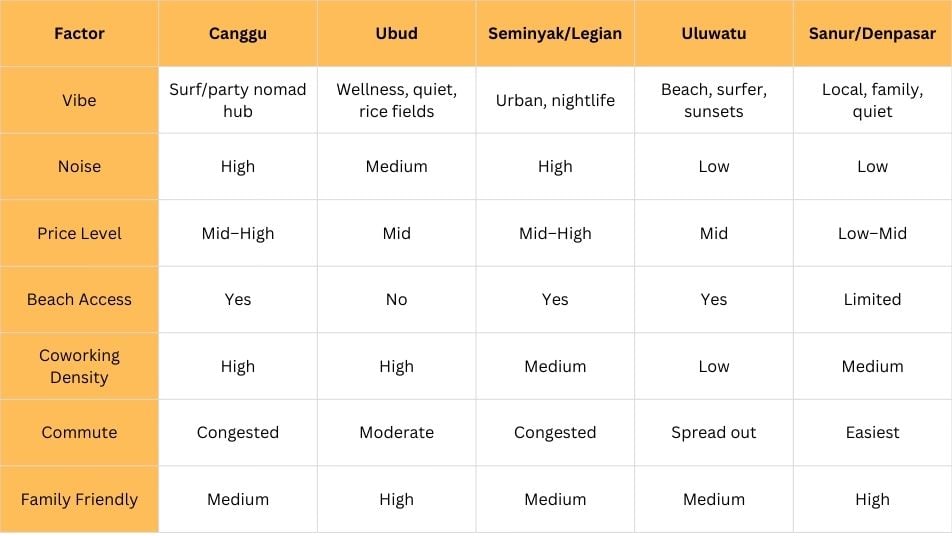Working Remotely from Bali: Best Areas, Infrastructure, Visa & Regulations, and More
by Dijiwa Sanctuaries

Bali Remote Work Guide: Areas, Infrastructure & Regulations
Working remotely from Bali in 2025 is a practical and lifestyle-driven choice . Bali ranks among the world’s leading digital nomad hubs because it combines tropical landscapes, international community networks, and reliable internet infrastructure . Post-pandemic remote work trends accelerated this shift, making Bali attractive for freelancers, startup founders, and global employees seeking both productivity and lifestyle balance .
Why Choose Bali for Remote Work?
Bali is a strong choice for remote work in 2025 for the following reasons:
- Reliable internet: Broadband and mobile networks make online work feasible across major hubs.
- Supportive community: The digital nomad network is extensive, with coworking spaces and weekly events in multiple areas.
- Affordable costs: Living expenses are lower than Western cities, though prices have risen compared to pre-2020.
- Work–life balance: Beaches, rice terraces, and wellness culture integrate naturally into daily routines.
- Lifestyle options: Early surfing sessions, relaxed café work, or yoga classes before meetings are common.
- Natural variety: Environments range from black-sand beaches to highland retreats, offering flexible spaces for work and leisure.
- Community connections: Integration is easy in hubs like Canggu and Ubud with dense international networks.
- Global comparison: Bali remains competitive with cities like Bangkok and Lisbon, despite certain infrastructure limitations.
Infrastructure for Remote Work in Bali
Infrastructure for remote work in Bali is well-developed, with high-speed internet available in popular hubs like Canggu and Ubud . The island offers many coworking spaces and work-friendly cafés that support productivity . A strong community of digital nomads provides additional networking and collaboration opportunities .
Internet & Power for Working Remotely from Bali
- Mobile internet: Reliable with Telkomsel, Indosat, and XL as main providers.
- eSIM availability: Purchase at Ngurah Rai airport or via digital apps.
- Prepaid data: Starts at IDR 100,000 (USD ~6.50) for 20–25 GB.
- Fiber internet: Biznet, IndiHome, and MyRepublic offer 50–150 Mbps for IDR 500,000–900,000/month.
- Speed ranking: Among the highest in Southeast Asia, ensuring stable connections.
- Power supply: Outages occur occasionally but are rare in urban hubs.
- Backup options: Dual SIM phones, portable hotspots, and compact UPS units support reliability.
Coworking Spaces in Bali
- Canggu: BWork, Dojo, and Tropical Nomad are leading hubs.
- Ubud: Outpost, Beluna, and the legacy Hubud serve wellness-focused professionals.
- Sanur: Livit Hub supports entrepreneurs and startups.
- Uluwatu: Boutique coworking like Kinship Studio offers scenic alternatives.
- Pricing: Day passes range from IDR 150,000–300,000; monthly memberships cost IDR 2.5–4 million.
- Facilities: Most provide phone booths, meeting rooms, and community events.
Note: You can visit Dijiwa Sanctuaries and choose a coworking space based on the location. For example, in Ubud, you can work at Café Lotus.
Cafés & Accommodation for Working Remotely from Bali
- Cafés: Common in Canggu, Ubud, and Seminyak, though Wi-Fi and outlets vary.
- Remote-ready stays: Villas, boutique hotels, and co-living options now feature desks, ergonomic seating, and backup internet.
- Budget housing: Guesthouses cost IDR 4–6 million per month.
- Co-living villas: Range between IDR 10–20 million monthly depending on amenities and location.
- Balance: Options allow remote workers to combine affordability with comfort and reliability.
Legality and Stay Permits in Bali for Remote Workers
Remote workers in Bali must comply with Indonesia’s visa rules. Key options include:
- Visa on Arrival (VOA/e-VOA): Valid for 30 days, extendable once for another 30 days.
- B211A Visit Visa: Allows stays up to 180 days, costs IDR 3.5–4 million including extensions.
- KITAS Permits: Available for investors, dependents, and retirees, but not designed for freelancers.
- Second Home Visa: Requires a deposit of IDR 2 billion (~USD 130,000) in Indonesian banks, aimed at high-net-worth individuals.
- Digital Nomad Visa: Proposed but not implemented as of September 2025.
- Remote Work Rules: Work for overseas employers is tolerated but exists in a legal grey area; local employment requires a formal work KITAS.
- Overstay Penalties: Fines of IDR 1 million per day with risk of blacklisting.
- IMI-417 Regulation (2023): Requires applicants to be physically present for visa extensions, ending proxy renewals via agents.
- Official Updates: Always verify through the Indonesian Immigration website.
Daily Life in Bali for Remote Workers
Daily life in Bali blends productivity with leisure, where mornings may begin with surfing, yoga, or quiet time in nature before work at a coworking space or café .
- Transport: Scooters rent for IDR 800,000–1.2M/month, with fuel at ~IDR 12,000/litre. An International Driving Permit (IDP) is required. Grab and Gojek serve most cities, while car rentals cost IDR 3–5M/month. Traffic is heavy in Canggu and Denpasar.
- Food & Lifestyle: Local warung meals cost IDR 20,000, while vegan cafés often exceed IDR 80,000. Western groceries are more expensive, but traditional markets remain affordable. Wellness culture thrives with yoga studios, gyms, and spas concentrated in Ubud and Canggu.
- Health: Major hospitals include Siloam, BIMC, and Sanglah. Health insurance is essential because private care can be costly. Common risks are Bali belly, dengue, and scooter accidents. Pharmacies are widely available, and travel insurance covering outpatient care is recommended.
- Community: Remote workers join networking events, hackathons, and meetups. Online hubs such as Facebook groups and Telegram chats support newcomers. Coworking spaces and co-living villas host weekly social activities that encourage collaboration and connection.
Challenges and Things to Know
Bali has several challenges that remote workers must anticipate despite its appeal:
- Weather: Dry season runs from April to October, while wet season spans November to March. Heavy rains often flood roads in Canggu, Denpasar, and Sanur, causing delays and safety issues.
- Culture: Daily offerings (canang sari) must not be stepped over, temples require proper dress, and Nyepi (Day of Silence) stops all activities across the island once a year.
- Infrastructure: Frequent traffic jams, inconsistent sidewalks, and occasional power cuts remain common in both urban and rural areas.
- Visa compliance: Overstays are fined IDR 1 million per day and may result in blacklisting for repeat offenders.
- Ceremonial disruptions: Religious events can close roads and increase noise levels, requiring adjustments to daily schedules.
- Mindset: Patience, flexibility, and cultural awareness are essential for ensuring smoother stays and avoiding unnecessary conflicts.
Best Areas to Live and Work in Bali
The best areas in Bali for remote workers vary by lifestyle preference. Here is a comparison of Canggu, Ubud, Seminyak/Legian, Uluwatu, and Sanur/Denpasar:

Note: Canggu is the most popular digital nomad hub, but it is crowded. Ubud offers calm surroundings ideal for focused work. Seminyak and Legian balance work and nightlife. Uluwatu provides a relaxed surf lifestyle but fewer work facilities. Sanur and Denpasar are cheaper and more family-friendly.
Practical Tips for Remote Workers in Bali
Remote workers in Bali should carry a universal adapter, use backup internet, and choose housing with stable Wi-Fi . Joining coworking communities builds networks, while adjusting schedules to EU/US time zones supports global work . Always keep passport, visa, and insurance documents accessible for emergencies .
First 48 Hours Checklist
- Purchase a local SIM or eSIM from Telkomsel or Indosat for immediate connectivity .
- Pay the Bali Tourism Levy of IDR 150,000 online before arrival or at the airport upon entry .
- Withdraw cash and activate QRIS payment apps such as OVO or GoPay for seamless transactions .
- Rent a scooter with a helmet or activate Grab and Gojek for safe transport options .
- Explore a coworking space by purchasing a day pass to test facilities and networks .
- Walk around the neighborhood to locate essentials such as ATMs, clinics, and local warungs .
- Establish a safety routine that includes backup internet, emergency medical contacts, and key local services .
Working Remotely from Bali
Bali in 2025 stands as a leading global destination for remote work . The island combines affordable living, strong international communities, and deep cultural traditions with natural tropical beauty . Challenges such as traffic, seasonal weather, or visa rules exist, but proper preparation ensures comfort and consistent productivity . Bali is well suited for freelancers, startup founders, and digital nomads who value efficiency alongside lifestyle richness . The phrase Work hard, surf harder reflects the authentic spirit of working remotely from Bali.
Discover Dijiwa Sanctuaries — boutique resorts designed for remote workers who value productivity and tranquility. Enjoy high-speed Wi-Fi, serene villas, and cultural immersion while working from paradise.

